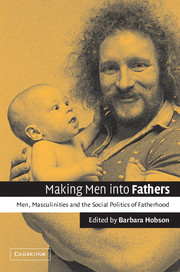Book contents
- Frontmatter
- Contents
- List of figures
- List of tables
- Preface
- Introduction: making men into fathers
- Part 1 Who fathers?
- Part 2 Men in social policy and the logics of cash and care
- 2 Citizens, workers or fathers? Men in the history of US social policy
- 3 Compulsory fatherhood: the coding of fatherhood in the Swedish welfare state
- 4 The problem of fathers: policy and behavior in Britain
- 5 A new role for fathers? The German case
- 6 Transformations of fatherhood: the Netherlands
- Part 3 Resisting and reclaiming fatherhood
- Part 4 Theorizing men, masculinities and fatherhood
- Notes
- References
- Index
3 - Compulsory fatherhood: the coding of fatherhood in the Swedish welfare state
Published online by Cambridge University Press: 22 September 2009
- Frontmatter
- Contents
- List of figures
- List of tables
- Preface
- Introduction: making men into fathers
- Part 1 Who fathers?
- Part 2 Men in social policy and the logics of cash and care
- 2 Citizens, workers or fathers? Men in the history of US social policy
- 3 Compulsory fatherhood: the coding of fatherhood in the Swedish welfare state
- 4 The problem of fathers: policy and behavior in Britain
- 5 A new role for fathers? The German case
- 6 Transformations of fatherhood: the Netherlands
- Part 3 Resisting and reclaiming fatherhood
- Part 4 Theorizing men, masculinities and fatherhood
- Notes
- References
- Index
Summary
Feminist scholars have coined the term women friendly to refer to the Scandinavian welfare states. Does this mean that these states are men unfriendly? These are societies with policies that have allowed women to combine work and family responsibilities, in which the male breadwinner wage ideology is weak. They are welfare states that are enabling for women in that they provide women with opportunities to organize households without husbands and to exit bad marriages or form families outside of marriage. From this perspective, we can say that the Scandinavian welfare states are unfriendly to men in that they undermine what Robert Connell refers to as the patriarchal dividend, the overall advantage that men receive from the overall subordination of women (Connell 1995: 79).
However, to say that Sweden, for example, typifies the weak male breadwinner model (Lewis 1992) does not imply that men are no longer the main earners in the family economy in these societies. There is no evidence for this either from the statistics on men's average work hours, the division of paid work as seen in time budget studies or the amount of earnings that women have after divorce (Hobson 1994; Hobson and Takahashi 1997; Flood and Gråsjö 2001; Takahashi forthcoming).
Rather than ask whether a society is men friendly or unfriendly, we might recast the question and consider how the policy framework has shaped the way in which societies define what is men friendly and in what spheres of life.
- Type
- Chapter
- Information
- Making Men into FathersMen, Masculinities and the Social Politics of Fatherhood, pp. 92 - 124Publisher: Cambridge University PressPrint publication year: 2002
- 65
- Cited by



